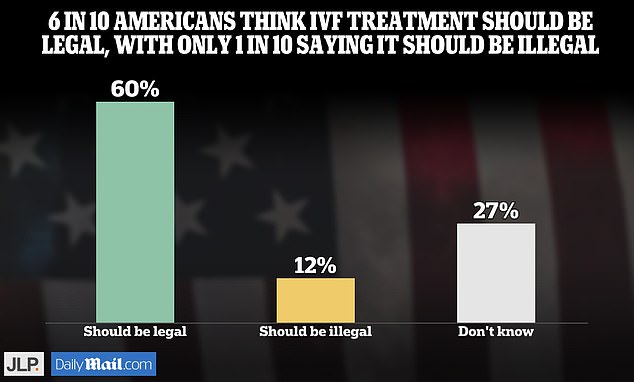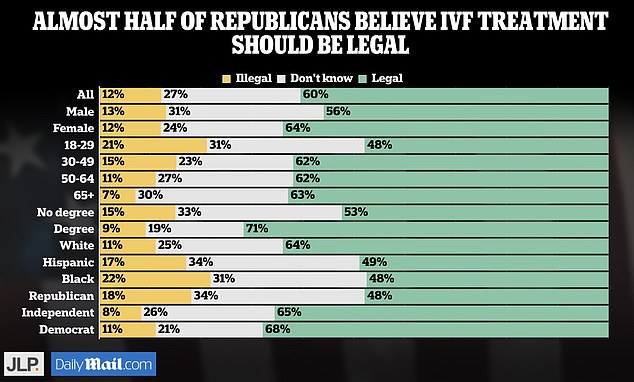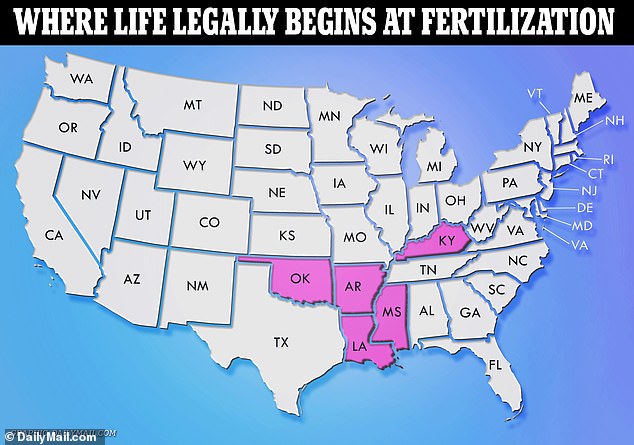Americans of all ages and political persuasions have backed IVF in an exclusive poll conducted by DailyMail.com, despite the Alabama Supreme Court’s controversial ruling last month.
Overall, 60 percent said the treatment should remain legal, while only 12 percent said it should be illegal, according to our survey of 1,000 voters.
Meanwhile, 27 percent said they didn’t know either way.
The groups with the narrowest majorities in favor of in vitro fertilization (IVF) were black and Latino, people between 18 and 29 years old, and Republicans.
In contrast, the greatest support came among people over 65, whites, college graduates and Democratic voters.
The results come after fertility treatment came into the spotlight last month when an Alabama court ruled that frozen embryos have the same rights as children.



While the Alabama ruling did not directly restrict IVF, it could open the door to wrongful death lawsuits for discarded embryos.
JL Partners conducted the survey on behalf of DailyMail.com earlier this month. It included a sample of 1,005 likely voters ages 18 and older collected online.
We asked: ‘Do you think IVF treatment should be legal or illegal in the United States?’
Women were more likely than men to support IVF: 64 percent said it should be legal compared to 56 percent of men.
However, similar percentages of men and women (13 and 12 percent, respectively) said it should be illegal.
Among age groups, Americans ages 18 to 29 were the least likely to support fertility treatment, and less than half (48 percent) believed it should be legal.
All respondents aged 30 and older agreed that the law should allow IVF, and about 62 percent of all other age groups said so.
College graduates were more likely to support legalization than non-graduates: 71 percent versus 53 percent.
Additionally, two-thirds of white Americans believe IVF should be legal, but less than half of Hispanics and blacks (49 and 48 percent, respectively) said the same.
Among political parties, nearly half of Republicans, 48 percent, support fertility treatment, compared to 68 percent of Democrats and 65 percent of independent voters.
While it has been successful and has been performed since the 1980s, IVF has recently become controversial as debates over abortion and when life begins become more contentious.


Prominent states have written laws that stipulate that life begins at the moment of fertilization. In Louisiana, the intentional removal or destruction of a human embryo is illegal
Typically, when a person is trying to conceive, multiple embryos are created, frozen and stored and the most viable one is eventually implanted.
However, not all embryos created can implant and result in a live birth, either because they are not healthy enough or because a person decides they no longer want to use their embryos.
In some of these cases they will be discarded.
But because the Alabama ruling establishes that specimens are people, abortion opponents who argue that life begins at fertilization say the destruction of embryos should be illegal and treated as a crime.
And with the threat of a lawsuit, the fear is that doctors will stop performing IVF, severely limiting access to treatment and making it almost impossible for some people to have children.
Although Alabama’s Republican Governor Kay Ivey recently signed a bill that would protect IVF practitioners.
The ruling stemmed from a lawsuit filed by a group of IVF patients whose frozen embryos were destroyed in December 2020 when someone removed them from a cryogenic storage unit and threw them on the ground.
One judge cited the Bible in his decision, saying it would protect “the sanctity of unborn life.”
The ruling said: “The Wrongful Death of a Child Act applies to all unborn children, regardless of their location,” including “unborn children who are outside a biological womb at the time of their death.”
For people struggling to conceive due to age or health problems, those who want to have a child without a partner or same-sex couples, IVF is a common form of assisted reproductive technology (ART), accounting for more than 99 percent of all ART procedures. done.
The Department of Health and Human Services reports that approximately nine percent of married women and nine percent of men experience some form of infertility.
As a result, it is estimated that one in eight women has received some form of fertility assistance in their lifetime.
In 2021, according to the most recent data available, 86,140 babies born in the US (2.3 percent) were conceived using ART.

